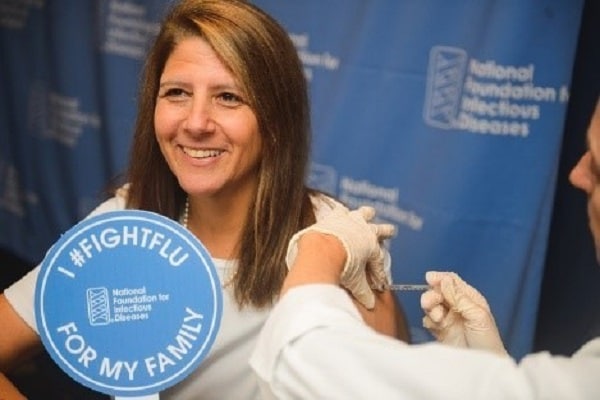At a glance
Marla Dalton, PE, CAE, is executive director and chief executive officer of the National Foundation for Infectious Diseases (NFID).

Background
NFID is a non-profit organization dedicated to educating the public and healthcare professionals about preventing and treating infectious diseases across the lifespan. Marla dedicates much of her time to educating others about the burden of flu and the importance of annual flu vaccinations.
Name: Marla Dalton, PE, CAE, executive director and chief executive officer of the National Foundation for Infectious Diseases (NFID)
Title: Executive director and chief executive officer of the National Foundation for Infectious Diseases (NFID)
Location: Bethesda, MD
In your role, how do you prepare for flu season each year?
The best way for all of us to prepare for flu season is by getting an annual flu vaccine, and by making sure that our families and friends do the same. At the NFID, our mission is to educate the public and healthcare professionals about the effective prevention and treatment of infectious diseases. Each flu season, NFID conducts research on attitudes and behaviors of U.S. adults regarding flu and pneumococcal disease and vaccines to prevent those diseases. What we learn helps to inform our strategies and messages for the flu season ahead.
What is the most difficult part of flu prevention?
NFID research has found that, although most people understand that annual vaccination is the best protection against flu, many still do not plan to get vaccinated. The most recent NFID survey found that 61 percent of U.S. adults agree that flu vaccination is the best preventive measure against flu-related deaths and hospitalizations, and yet 44 percent are either unsure or do not plan to get vaccinated against flu during the 2021-2022 flu season. Also, of concern, nearly 1 in 4 (23 percent) who are at higher risk for flu-related complications said they were not planning to get vaccinated this season, including adults age 65 and older and those with chronic health conditions including heart disease, lung disease, and diabetes. We must all work together to share clear and consistent messaging about the importance of annual flu vaccination, particularly for vulnerable populations.
Why do you think people underestimate the seriousness of flu illness?
Flu is often underappreciated as a serious disease since many do recover without long-term complications. We need to continue to emphasize the fact that even when flu vaccines don’t prevent the disease entirely, they can help prevent serious outcomes, including hospitalization and death. While the numbers vary, in a typical flu season in the U.S., millions get sick, hundreds of thousands are hospitalized, and tens of thousands die from flu and related complications.
Why is it important to get a flu shot every year?
Flu vaccines are updated annually to protect against the influenza viruses most likely to circulate during the upcoming season. Vaccine effectiveness can vary each season, even in cases when flu vaccines do not prevent infection completely, they can reduce the severity and duration of disease and can help prevent serious complications. Personally, I prioritize flu vaccination each year for my whole family to ensure that we are protected and that we don’t spread flu to those who are most vulnerable, including children, adults age 65 and older, pregnant women, and people with certain chronic health conditions.
What would you say to those who are hesitant about getting a flu shot?
Getting an annual flu vaccine helps protect not only yourself, but also those around you. There are many myths surrounding flu vaccines and taking time to listen to specific concerns and address each of them on a personal level is critical in overcoming vaccine hesitancy. The science is clear; vaccines save lives!
